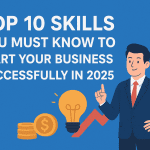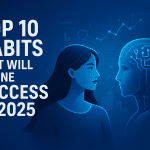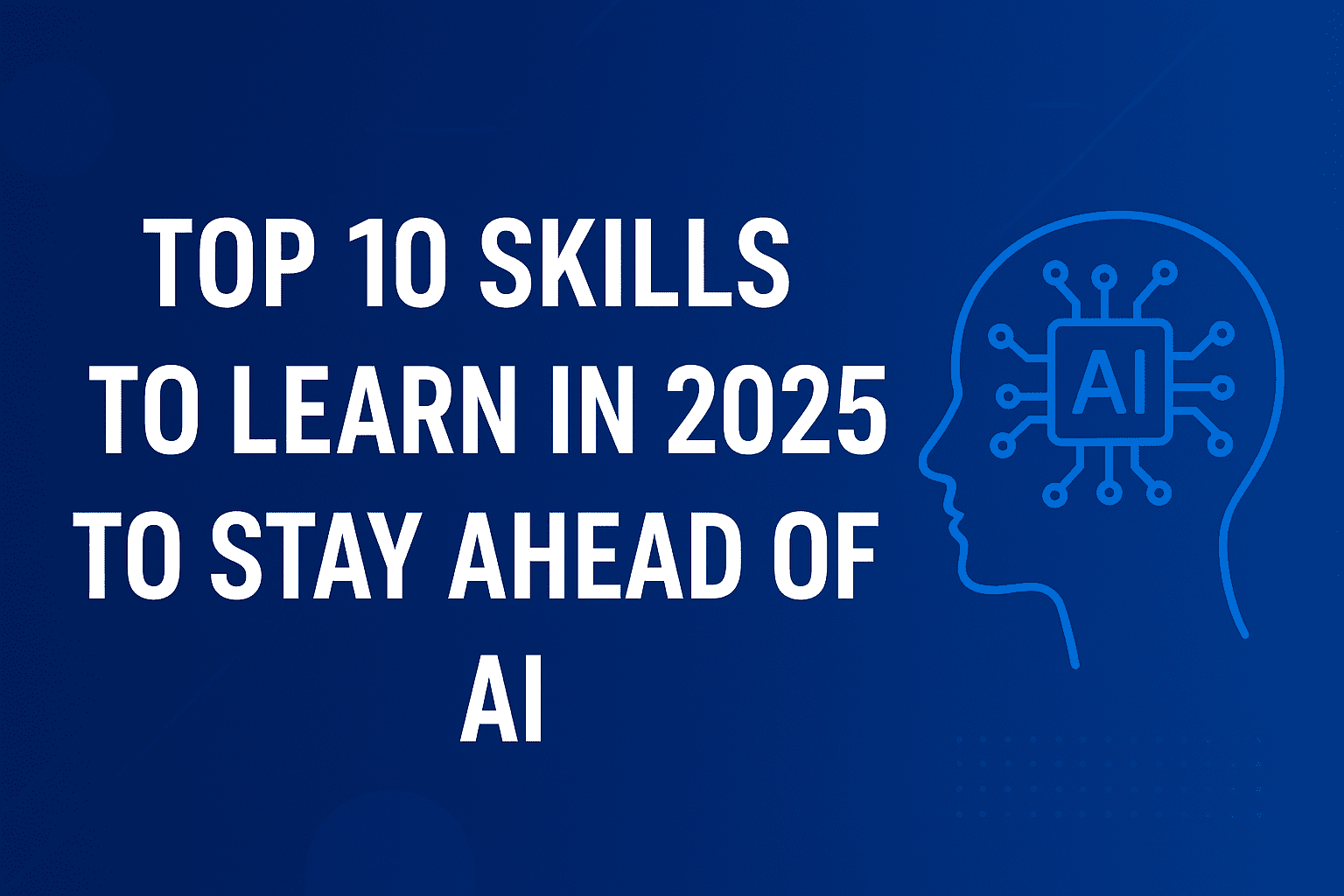Artificial Intelligence (AI) is no longer a futuristic concept — it’s here, shaping the world we live in. From automating workflows to generating content and analyzing complex data, AI has changed how businesses operate and how professionals work. But with these advancements comes a big question: How do we stay ahead of AI instead of being replaced by it?
The answer lies in learning human-centered, future-proof skills that complement technology rather than compete with it. In 2025, the most successful people will be those who understand how to work alongside AI — using it as a partner to boost creativity, productivity, and innovation.
Here are the top skills you should master in 2025 to stay competitive and future-ready. 👇
1. Critical Thinking and Problem-Solving 🧩
AI can crunch numbers, but it can’t think outside the box. Critical thinking is the human ability to interpret information, evaluate risks, and make complex decisions that machines can’t handle alone.
Professionals who can connect the dots between data, logic, and empathy will be indispensable.
🧠 How to build it:
- Analyze real-world case studies and question assumptions.
- Practice solving open-ended business or social challenges.
- Engage in debates or simulations that test reasoning under pressure.
💡 Example: A marketing manager who can combine AI-driven insights with consumer psychology to craft a human-centric campaign will always outperform an algorithm alone.
2. Emotional Intelligence (EQ) 💬
Emotional intelligence remains one of the most AI-resistant skills of all. As automation takes over repetitive tasks, the ability to understand, motivate, and empathize with people becomes even more vital.
Leaders with strong EQ create cultures of trust, resolve conflicts effectively, and inspire collaboration — things no machine can replicate.
🧠 Pro Tip: Practice mindfulness, active listening, and empathy-based leadership. The more human you are, the more valuable you become in an AI-driven world.
3. AI Literacy and Prompt Engineering 🤖
In 2025, knowing how to use AI tools will be as essential as knowing how to use email.
AI literacy isn’t just for tech experts — it’s about understanding how AI works, what it can (and can’t) do, and how to make it work for you.
Prompt engineering — crafting precise instructions for AI tools like ChatGPT or Midjourney — is now one of the most in-demand soft-technical skills. It helps you get accurate, creative, and efficient results.
🧠 Learn it by:
- Experimenting with different AI tools and use cases.
- Taking short online courses in prompt design and generative AI.
- Reading AI ethics and safety frameworks to understand its limitations.
4. Data Analytics and Interpretation 📊
AI thrives on data — but it still needs humans to interpret and apply it meaningfully.
Understanding data helps professionals identify trends, improve decision-making, and optimize performance.
🧠 Start with tools like:
- Google Analytics, Power BI, Tableau, or Python.
- No-code tools such as Airtable or Notion dashboards for smaller projects.
💡 Tip: Data skills aren’t just for analysts — marketers, HR managers, and even educators can benefit from understanding data-driven insights.
5. Creativity and Innovation 🎨
The irony of the AI revolution is that creativity is more valuable than ever.
Machines can replicate patterns but not originality. In 2025, creative thinkers — from content creators to designers and entrepreneurs — will lead innovation by merging human imagination with AI’s computational power.
🎨 Use AI as your creative partner:
- Combine tools like Adobe Firefly, Runway ML, and ChatGPT for ideation.
- Experiment with generative design or AI-assisted storytelling.
- Focus on creating emotionally engaging, human-centric work.
6. Cybersecurity and Digital Ethics 🔒
As AI systems handle more data, cybersecurity and ethical technology practices are essential.
Data breaches, misinformation, and algorithmic bias can destroy trust. Professionals who understand digital safety, AI transparency, and responsible innovation will be in high demand.
🧠 Learn the basics of encryption, data protection laws (like GDPR), and ethical AI frameworks.
💡 Pro Tip: Businesses need people who can balance innovation with responsibility — ensuring that AI benefits society without harming privacy or fairness.
7. Adaptability and Continuous Learning 🔁
The most important skill of all is the ability to keep learning.
In a world where technology changes monthly, adaptability is what separates leaders from laggards.
🧠 Keep learning through:
- Micro-courses on platforms like Coursera, Udemy, and LinkedIn Learning.
- Reading about emerging tech trends.
- Networking with future-focused communities.
💬 Mindset shift: Don’t fear AI — grow with it. Each new advancement is a new opportunity to learn something valuable.
8. Leadership in the Age of Automation 👑
Tomorrow’s leaders must manage hybrid teams — not just people, but also AI systems.
Great leadership in 2025 means balancing human empathy with digital strategy, guiding teams through change, and building a culture of innovation.
🧠 Develop leadership by:
- Learning how to integrate AI into team workflows.
- Encouraging transparency and creative risk-taking.
- Focusing on mentorship, not micromanagement.
9. Digital Communication and Storytelling 🗣️
No matter how advanced technology becomes, communication remains king.
The ability to tell a compelling story — especially one supported by data or AI insights — is a rare and powerful skill.
🧠 Master tools like Canva, Notion AI, or PowerPoint AI to make your presentations pop.
🎙️ Learn how to simplify complex topics for diverse audiences.
💡 Remember: In 2025, those who can communicate clearly will lead — because clarity is more valuable than complexity.
10. Tech Fundamentals and No-Code Tools ⚙️
You don’t have to be a coder to succeed in tech. The rise of no-code platforms means anyone can automate workflows, build websites, and even create AI-driven apps.
🧠 Start with:
- Zapier (for automation)
- Bubble or Webflow (for app building)
- Notion AI or Airtable (for project management)
Learning these tools saves time, boosts productivity, and positions you as a digital-native problem solver.
🌍
AI isn’t here to replace humans — it’s here to amplify what humans can do.
The real winners of 2025 will be those who blend empathy, creativity, and technology into one powerful toolkit.
The future belongs to the curious — the people willing to learn, adapt, and lead in a world where AI and humanity grow together.
So don’t just survive the AI revolution — shape it. 🚀
As AI continues to evolve at lightning speed, the most valuable thing you can do in 2025 is invest in the skills that set you apart — the ones that deepen your creativity, sharpen your critical thinking, and strengthen your ability to work alongside intelligent machines. The skills highlighted in this guide aren’t just trends; they are the foundation of long-term career resilience in an AI-driven world.
Whether you choose to master advanced tech skills, develop stronger communication, or focus on human-centered capabilities like problem-solving and innovation, each step you take today builds your competitive edge for tomorrow. Remember, AI is not here to replace you — it’s here to elevate those who are willing to evolve, learn continuously, and adapt with confidence.
Embrace these skills now, and 2025 will not just be the year you keep up with AI — it will be the year you rise above it.









